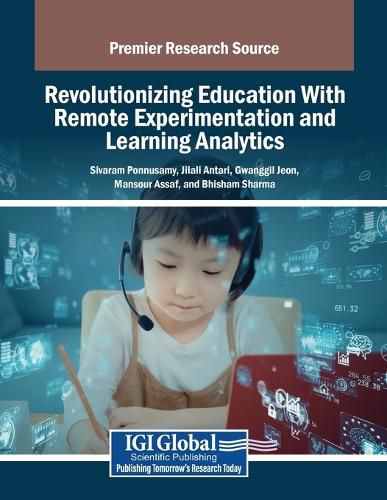Readings Newsletter
Become a Readings Member to make your shopping experience even easier.
Sign in or sign up for free!
You’re not far away from qualifying for FREE standard shipping within Australia
You’ve qualified for FREE standard shipping within Australia
The cart is loading…






This title is printed to order. This book may have been self-published. If so, we cannot guarantee the quality of the content. In the main most books will have gone through the editing process however some may not. We therefore suggest that you be aware of this before ordering this book. If in doubt check either the author or publisher’s details as we are unable to accept any returns unless they are faulty. Please contact us if you have any questions.
Education is undergoing critical transformations driven by innovations in remote experimentation and learning analytics. As technology reshapes how we teach and learn, remote experimentation allows students to conduct hands-on, interactive experiments from anywhere in the world, breaking down geographical and resource-based barriers. This shift enhances access to advanced learning opportunities while fostering engagement and practical understanding in fields traditionally reliant on in-person labs. Learning analytics harness the power of data to track student progress, personalize learning experiences, and identify areas for improvement in real time. Together, these tools revolutionize education by providing more flexible, inclusive, and data-driven approaches that can adapt to individual learning needs, paving the way for an effective and accessible global education system. Revolutionizing Education With Remote Experimentation and Learning Analytics explores how digital technology may change how schools work. It examines learning analytics and remote experimentation for improved education, while delving into the most recent findings and cutting-edge approaches. This book covers topics such as data analysis, higher education, and student engagement, and is a useful resource for educators, academicians, researchers, data scientists, computer engineers, and sociologists.
$9.00 standard shipping within Australia
FREE standard shipping within Australia for orders over $100.00
Express & International shipping calculated at checkout
This title is printed to order. This book may have been self-published. If so, we cannot guarantee the quality of the content. In the main most books will have gone through the editing process however some may not. We therefore suggest that you be aware of this before ordering this book. If in doubt check either the author or publisher’s details as we are unable to accept any returns unless they are faulty. Please contact us if you have any questions.
Education is undergoing critical transformations driven by innovations in remote experimentation and learning analytics. As technology reshapes how we teach and learn, remote experimentation allows students to conduct hands-on, interactive experiments from anywhere in the world, breaking down geographical and resource-based barriers. This shift enhances access to advanced learning opportunities while fostering engagement and practical understanding in fields traditionally reliant on in-person labs. Learning analytics harness the power of data to track student progress, personalize learning experiences, and identify areas for improvement in real time. Together, these tools revolutionize education by providing more flexible, inclusive, and data-driven approaches that can adapt to individual learning needs, paving the way for an effective and accessible global education system. Revolutionizing Education With Remote Experimentation and Learning Analytics explores how digital technology may change how schools work. It examines learning analytics and remote experimentation for improved education, while delving into the most recent findings and cutting-edge approaches. This book covers topics such as data analysis, higher education, and student engagement, and is a useful resource for educators, academicians, researchers, data scientists, computer engineers, and sociologists.